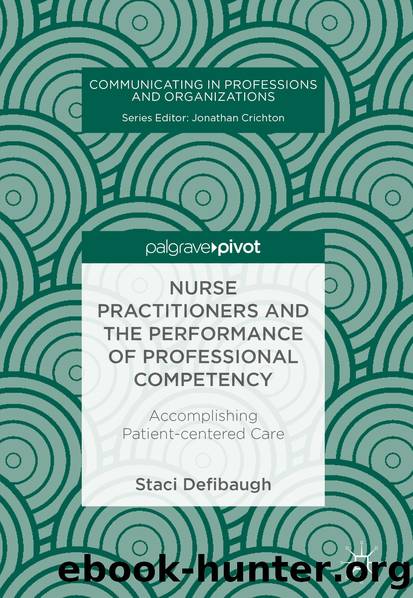Nurse Practitioners and the Performance of Professional Competency by Staci Defibaugh

Author:Staci Defibaugh
Language: eng
Format: epub
Publisher: Springer International Publishing, Cham
The first part of the excerpt highlights Ms. Piper’s concern, which is about having blood sugar levels that are too low that would cause her to go into a diabetic coma. She first frames here concern as “how to treat” diabetes (line 6). She then highlights her prior knowledge by stating that both her parents “are diabetic” (lines 6–7), thereby claiming a certain amount of epistemic access . She then expresses her real concern in the form of a short narrative about an experience with her mother (lines 6–8, 10, and 12) in which her blood sugar levels were dangerously low, causing her to go into a diabetic coma. Ms. Piper again demonstrates her epistemic access with relation to diabetes through this story, showing that she knows the dangers of low blood sugar levels. June first aligns with Ms. Piper’s narrative experience, even upgrading her evaluative assessment of the situation as “very scary” (line 13). In doing so, June acknowledges Ms. Piper’s concerns, possibly in an effort to create rapport with her, even though, as is shown later in the excerpt, low blood sugar levels are not especially concerning for June. June then shifts the topic entirely (line 15) by asking about Ms. Piper’s family and work life, topics that do not seem relevant to Ms. Piper’s concerns about low blood sugar. This shift indicates a lack of desire to discuss low blood sugars and a lack of concern about this topic.
In the second part of the excerpt, June focuses on the need to get blood sugar levels into a healthy range, a way of enacting her epistemic authority by redirecting the talk to what she sees as most pressing. She explains that Ms. Piper’s blood sugar should be in the one hundreds, what she refers to as “good number(s)” (lines 134–135, 139, 142–143) and that it is in her “best interest to get out of the big numbers” (150–152) “quickly” (146). June draws on her epistemic authority of working with patients with high blood sugars to draw Ms. Piper’s attention to what she views as the most significant concern and, in doing so, increases Ms. Piper’s knowledge of diabetes to include issues of high blood sugar levels, not just low.
Additionally, June reinforces her epistemic authority through aligning with the patient by acknowledging her symptoms of low blood sugar but prioritizing reliance on empirical data rather than sensations, as they can be an unreliable measure. She cautions Ms. Piper not to rely on feelings of “shaky, sweaty” (136) or more generally feeling “crappy” (131) but instead, in these moments, to check her blood sugar (lines 131–132, 136) and use that data instead. June’s information sharing in this part is two-fold. First, she is foregrounding the information that she knows to be most significant. As she explains to Ms. Piper earlier in the visit, there is “a lot to talk about with diabetes” and that it is “too much” to focus on all of it. Instead, she focuses on what is most significant for Ms.
Download
This site does not store any files on its server. We only index and link to content provided by other sites. Please contact the content providers to delete copyright contents if any and email us, we'll remove relevant links or contents immediately.
The Motivation Myth by Jeff Haden(5213)
Audition by Ryu Murakami(4932)
Adulting by Kelly Williams Brown(4574)
The Confidence Code by Katty Kay(4264)
A Mind For Numbers: How to Excel at Math and Science (Even If You Flunked Algebra) by Barbara Oakley(3307)
Waiting in the Wings by Melissa Brayden(3220)
Self-Esteem by Matthew McKay & Patrick Fanning(3144)
Fooled by Randomness: The Hidden Role of Chance in Life and in the Markets by Nassim Nicholas Taleb(3124)
The ONE Thing by Gary Keller(3071)
Nice Girls Don't Get the Corner Office by Lois P. Frankel(3046)
The Dictionary of Body Language by Joe Navarro(2999)
How to be More Interesting by Edward De Bono(2793)
Designing Your Life by Bill Burnett(2748)
Getting Things Done by David Allen(2701)
The Plant Paradox by Dr. Steven R. Gundry M.D(2624)
Police Exams Prep 2018-2019 by Kaplan Test Prep(2549)
What Color Is Your Parachute? 2015 by Richard N. Bolles(2311)
Dangerous Personalities by Joe Navarro(2290)
When to Jump by Mike Lewis(2241)
